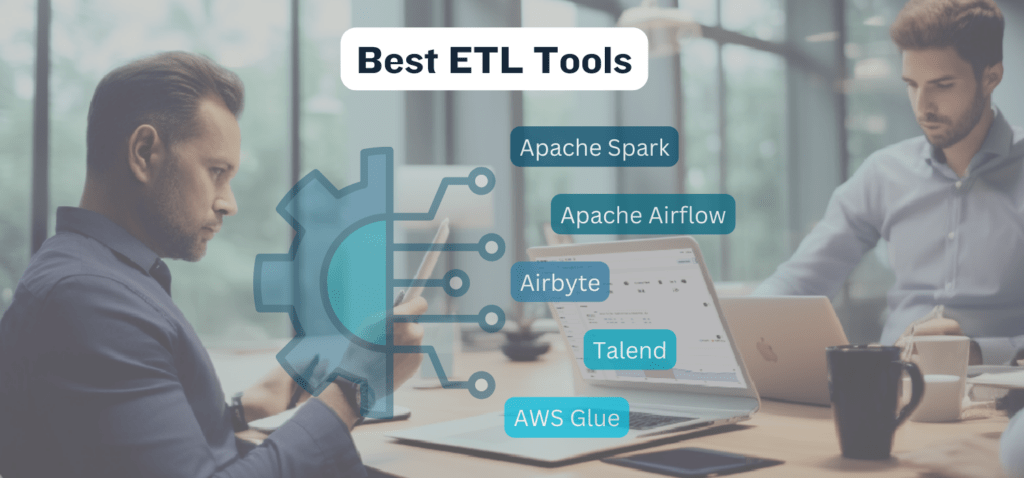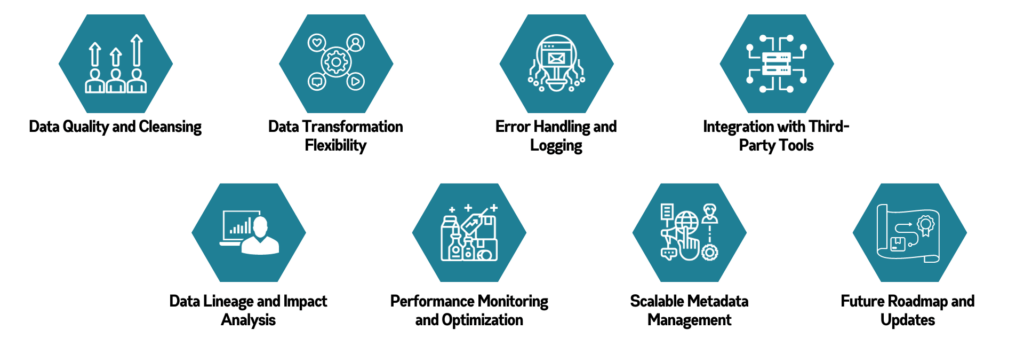Businesses face the challenge of integrating, transforming, and loading data efficiently. ETL (Extract, Transform, Load) tools have emerged as indispensable allies, bridging the gap between disparate data sources and meaningful insights. As we step into 2024, the demand for robust ETL solutions continues to rise. This article explores the nuances of ETL tools, delving into the top contenders for the year and guiding businesses towards optimal data integration.

Which are the top 5 ETL tool in 2024?
At the core of modern data processing lies ETL, a process that embodies Extraction, Transformation, and Loading. Extraction involves retrieving raw data from various sources, Transformation refines and enriches the data to meet specific business needs, and Loading involves storing the transformed data into a target destination. ETL tools act as orchestrators, ensuring this intricate dance of data occurs seamlessly, making unified, actionable insights possible. The top tools we have identified for 2024 are: Apache Spark, Apache Spark, Airbyte, Talend and AWS Glue. See our in-depth reasoning below.
Overview
Types of ETL Tools
ETL tools come in diverse forms, catering to a wide array of requirements. Here are several popular categories of ETL tools:
Open-Source ETL Tools
Open-source solutions offer adaptability and customization for seamless data integration. These tools, prized by technically proficient teams, provide an extensive range of features and are particularly favored for their cost-effectiveness.
Cloud-Based ETL Tools
Cloud-based ETL tools harness the capabilities of cloud computing to manage large-scale data integration tasks efficiently. They boast scalability, cost-efficiency, and seamless integration with other cloud services, making them ideal for businesses seeking flexibility.
Enterprise-Grade ETL Tools
Enterprise-grade tools deliver comprehensive features and robust functionalities. Tailored for intricate data integration scenarios, these tools offer advanced capabilities such as data governance and metadata management, making them indispensable for complex organizational needs.
Real-Time ETL Tools
Real-time ETL tools concentrate on streaming data integration. They empower organizations to process and merge data instantaneously, ensuring that insights are current and timely. This real-time processing capability is invaluable for businesses requiring up-to-the-minute data analysis.
Self-Service ETL Tools
Self-service ETL tools empower business users to conduct data integration tasks independently, minimizing their dependence on IT teams. These intuitive tools feature drag-and-drop interfaces, requiring minimal coding knowledge. Moreover, they facilitate seamless data integration, allowing users to effortlessly manipulate and analyze data without technical hurdles.
Criteria for Evaluating ETL Tools
Choosing the right ETL tool requires careful consideration of multiple criteria. Data sources compatibility, transformation capabilities, scalability to handle large datasets, ease of use for efficient workflows, data security measures, and adherence to compliance standards are pivotal factors. By evaluating ETL tools against these benchmarks, businesses can make informed decisions tailored to their unique requirements.

Top 5 ETL Tools in 2024
Apache Spark
Apache Spark continues to dominate the ETL landscape with its lightning-fast data processing engine. Its ability to handle real-time data processing, coupled with advanced analytics capabilities, positions it as a front-runner for businesses demanding high-performance ETL solutions.
Apache Spark Key Features
- Speed: Apache Spark is known for its speed and can handle large-scale data processing tasks efficiently.
- Ease of Use: It offers easy-to-use APIs in Java, Scala, Python, and SQL, making it accessible to developers with different skill sets.
- Versatility: Spark supports various data sources and data formats, enabling seamless integration with diverse data systems.
- Advanced Analytics: In addition to ETL, Spark provides libraries for machine learning (MLlib) and graph processing (GraphX), allowing for advanced analytics on your data.
- Distributed Computing: Spark distributes data processing tasks across clusters of computers, enabling parallel processing and high availability.
Apache Airflow
The Apache Airflow is an open-source platform for orchestrating complex workflows and data pipelines. With its powerful scheduler and intuitive interface, it enables businesses to automate ETL tasks, ensuring seamless data integration and transformation.
Apache Airflow Key Features
- Workflow Orchestration: Airflow allows the creation and orchestration of complex workflows, making it easy to design and monitor ETL processes.
- Extensibility: It supports a wide range of integrations and plugins, enabling businesses to customize and extend its functionality according to specific requirements.
- Scalability: Airflow can scale horizontally to handle large volumes of data and high-demand workloads, ensuring efficient ETL operations.
- Dynamic Workflows: In addition to it supports dynamic, parameterized workflows, allowing for flexibility and adaptability in handling diverse data sources and processing requirements.
- Monitoring and Alerting: Airflow provides comprehensive monitoring features, including logging, alerting, and visualization, to ensure the health and performance of ETL processes.
Airbyte
Airbyte is an open-source ETL platform that focuses on simplifying data integration for businesses. With its user-friendly interface and a growing library of connectors also, Airbyte empowers organizations to connect to various data sources, transform data, and load it into desired destinations effortlessly.
Airbyte Key Features
- Connector Library: Airbyte offers a growing collection of pre-built connectors for popular data sources, allowing businesses to quickly set up integrations without extensive development efforts.
- Data Transformation: It supports data transformation using SQL-based transformations, enabling users to clean, enrich, and manipulate data as needed.
- Real-Time Data Sync: Airbyte supports real-time data synchronization, ensuring that integrated data is always up-to-date and available for analysis.
- Community-driven Development: Being open-source, Airbyte benefits from a vibrant community of developers and users, leading to continuous improvements and updates.
- User-Friendly Interface: Airbyte provides an intuitive, web-based interface for designing, testing, and monitoring data pipelines, making it accessible to both technical and non-technical users.
Talend
Talend, an open-source ETL tool, combines versatility with ease of use. Its flexibility allows businesses to create tailored data integration solutions while its scalability ensures seamless operations across varying workloads. Talend’s extensive community support further enhances its appeal among businesses of all sizes.
Talend Key Features
- Open-Source: Talend is open-source, making it cost-effective and allowing the community to contribute to its development.
- Extensive Connectors: Talend provides a wide array of pre-built connectors for various data sources and applications, simplifying integration tasks.
- Data Mapping and Transformation: It offers graphical tools for data mapping and transformation, enabling users to design ETL processes visually.
- Data Quality: Talend includes data quality features such as data profiling and cleansing to ensure accurate and reliable data integration.
- Collaboration: Talend supports team collaboration, allowing multiple users to work on the same ETL project simultaneously.
AWS Glue
AWS Glue, a managed ETL service by Amazon Web Services, offers a serverless and scalable solution. Its seamless integration with other AWS services, automated data cataloging, and cost-effective pricing make it an excellent choice for businesses operating within the AWS ecosystem, streamlining their data workflows effortlessly.
AWS Glue Key Features
- Serverless Architecture: Glue is fully managed and serverless, automatically scaling resources based on the workload, reducing the operational overhead.
- Data Catalog: It includes a centralized metadata repository, making it easier to discover, manage, and control access to various data sources.
- Data Preparation: Glue offers automated data preparation features, including schema discovery, data cleansing, and normalization, streamlining the ETL process.
- Integration with AWS Services: Seamless integration with other AWS services such as Amazon S3, Redshift, and Athena for storing, querying, and analyzing integrated data.
- ETL Code Generation: Glue can automatically generate ETL code in Python or Scala, saving development time and effort.
How ETL Tools Can Benefit Businesses
Implementing robust ETL tools offers multifaceted advantages to businesses, facilitating streamlined data integration, empowering informed decision-making, enhancing data quality, enabling comprehensive analytics capabilities, and improving operational efficiency. So, to select the most suitable ETL tool, a structured approach is essential. Begin by defining specific requirements, conducting in-depth research, and comparing options. Assess crucial factors such as:

Practical evaluation through trials and proof of concept is vital to ensure compatibility with existing systems, while also confirming seamless integration. Additionally, consider the total cost of ownership, review the quality of customer support and available documentation, and explore the vendor’s future roadmap and updates. Furthermore, by meticulously evaluating these aspects, businesses can make well-informed choices, aligning their data integration needs with the optimal ETL solution.
Conclusion
In the intricate tapestry of data management, selecting the right ETL tool is akin to finding the perfect puzzle piece; it completes the picture and unlocks the potential within. As businesses venture into 2024, the need for reliable, efficient, and scalable ETL solutions is more significant than ever. The journey toward data-driven success begins with informed choices. To explore further and find the perfect ETL solution tailored to your organization’s needs, visit Qmantic. Qmantic integrates in its solution a few of these ETLs such as Airflow and Airbyte, ensuring seamless and efficient data processing for your organization’s growth.






